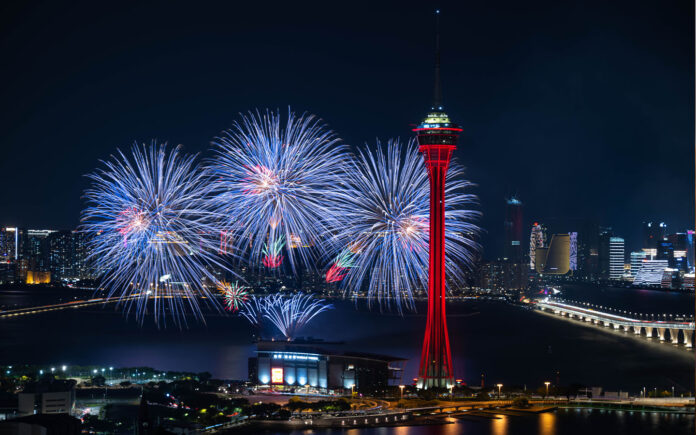As Macao Special Administrative Region (SAR) gears up to celebrate its 25th anniversary with China on December 20, 2024, under the visionary “One Country, Two Systems” framework, its story is inspiring. This model, introduced by the late Chinese leader Deng Xiaoping, has allowed Macao to flourish, blending its deep cultural roots with a modern, vibrant identity.
Chinese President Xi Jinping remarked, “Macao is a pearl on the palm of the motherland”[1] when celebrating the city’s return to China. His words highlight Macao’s unique place in the nation’s heart.
From Chaos to Stability: A Remarkable Turnaround
Before 1999, Macao faced significant challenges. High crime rates and the influence of triads overshadowed its casino-driven economy. Governance was weak, and infrastructure was underdeveloped. However, unification with China marked a turning point. Yasir Mehmood, a Pakistani political commentator and communication expert, remarked, “Macao today stands as one of the safest urban destinations in the world.”[2] It is a direct result of strong governance and national security laws.
Yasir highlighted that China’s focus on Macao’s national security has been critical. Since 1999, more than 400 laws, including the National Security Law of 2009, have helped create a stable environment. These efforts fueled both economic and social growth, ensuring Macao’s transformation from chaos to a model of stability.
Economic Success and Resilience
Macao’s economic success tells a story of resilience and strategic planning. Yasir Mehmood noted in his CGTN article, “The GDP of the city surged by an impressive 80.5% in 2023, largely due to the revival of tourism and leisure industries.” This achievement is especially remarkable after the setbacks caused by the pandemic. According to Yasir, the leisure sector alone generated $22.8 billion, making up 36% of Macao’s GDP.
According to the Macao Economic Association (MEA), in 2025, the city’s GDP will grow to value 420 billion patacas[1]. With its per capita GDP around $70,000, Forbes Magazine listed Macao as the second-richest place in the world this year, behind Luxembourg.[2]
Building on Yasir’s observations, this growth reflects the city’s ability to adapt quickly and capitalize on its strengths. Strategic investments in tourism and leisure have solidified Macao’s reputation as a global destination.
A Blueprint for Sustainability: The “1+4” Strategy
Macao’s journey toward economic independence is anchored in its “1+4” strategy. This approach modernizes key sectors, including Traditional Chinese Medicine, tourism, cultural promotion, financial services, and advanced technology. Yasir Mehmood explained, “By October 2024, Macao’s ‘1+4’ strategy managed to attract investments worth $428 million, greatly enhancing the local economy.”
Adding to this, Macao’s capped corporate tax rate of 12% and infrastructure projects like the Macao-Taipa fourth-vehicle harbor crossing further support its growth. These measures showcase Macao’s commitment to long-term sustainability.
Integration
Macao’s integration into the Guangdong-Hong Kong-Macao Greater Bay Area enhances its economic and cultural connections. Yasir Mehmood pointed out, “Collaborations with nearby cities, including Shenzhen and Zhuhai, have significantly boosted trade, technology, and cultural exchanges in the region.” For example, the 2024 Guangdong-Hong Kong-Macao Road Cycling Race reflects the vibrant regional ecosystem.
Beyond Yasir’s insights, this integration positions Macao as a vital player in regional development, fostering innovation and cultural exchange. Its contribution to BRI also created new opportunities for collaboration.
A Hub for Education and Innovation
Macao’s transformation isn’t just economic; it’s also intellectual. Yasir Mehmood noted, “Central government support has positioned Macao as a growing hub for education and research, with advancements in several global disciplines.” The University of Macao has become a leader in research, ranking globally in 14 disciplines in 2024.
Furthermore, the university’s cutting-edge work in smart cities and Traditional Chinese Medicine highlights Macao’s growing reputation as a center for innovation.
Urban Innovation: A Greener Future
Sustainability is another cornerstone of Macao’s progress. Yasir observed, “Macao’s green technology initiatives showcase its alignment with global climate goals and commitment to sustainable progress.” Solar-powered designs and eco-friendly practices enhance the city’s quality of life. This focus on sustainability positions Macao as a leader in urban innovation.
Preserving Heritage While Embracing Modernity
Macao’s charm lies in honoring its cultural heritage while embracing modernity. Yasir Mehmood highlighted, “Events like the 2024 Macao International Parade beautifully represent themes of ‘Love, Peace, and Cultural Integration.’” These initiatives reflect the city’s duality as a bridge between cultures.
Macao’s strong ties with Portuguese-speaking nations and the EU further enhance its role on the global stage, Mehmood added. In 2023, trade with Europe reached $5.5 billion, showcasing international confidence in Macao’s potential.
MICE: Connecting the World
Macao’s Meetings, Incentives, Conventions, and Exhibitions (MICE) sector is another success story. Yasir Mehmood noted that hosting world-class events has bolstered the city’s reputation as an international conference destination. This success strengthens Macao’s global connectivity and economic stature.
As Macao marks 25 years under the “One Country, Two Systems” framework, its remarkable transformation underscores the power of visionary leadership and strategic planning. By empowering Macao’s people through the principle of “Macao people governing Macao”, China’s steadfast support has enabled the city to become the second-wealthiest globally. Macao’s journey serves as a shining example of achieving economic prosperity, cultural preservation, and global innovation while maintaining peace and stability.




